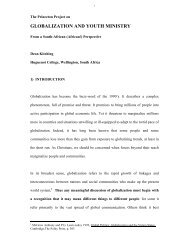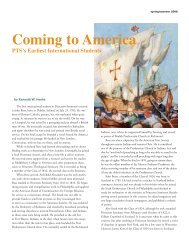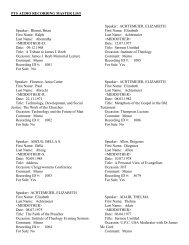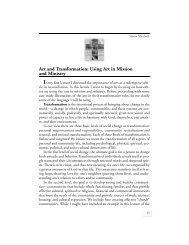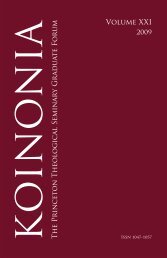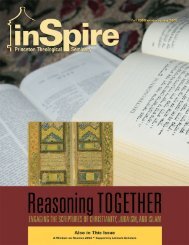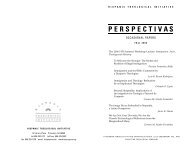Why did Jesus Have to Die?: An Attempt to Cross the Barrier of Age
Why did Jesus Have to Die?: An Attempt to Cross the Barrier of Age
Why did Jesus Have to Die?: An Attempt to Cross the Barrier of Age
- No tags were found...
Create successful ePaper yourself
Turn your PDF publications into a flip-book with our unique Google optimized e-Paper software.
<strong>Why</strong> Did <strong>Jesus</strong> <strong>Have</strong> <strong>to</strong> <strong>Die</strong>?: <strong>An</strong> <strong>Attempt</strong> <strong>to</strong> <strong>Cross</strong> <strong>the</strong> <strong>Barrier</strong><strong>of</strong> <strong>Age</strong> • STANLEY HAUERWASOn Being Young and Being ChristianI lecture and write <strong>of</strong>ten, but I am not sure how <strong>to</strong> write <strong>to</strong> those our society identifies as <strong>the</strong> young or adolescents. Ido not know who you are and I am a bit frightened by that unknown. The last band I knew was U2 and I only knew<strong>the</strong>m because <strong>the</strong>y were <strong>the</strong> last group introduced <strong>to</strong> me by my son before he “grew up.” I do not know what you read or<strong>the</strong> movies you see. So I do not know how <strong>to</strong> “connect” with you.Moreover, I think it is disgusting for an older guy <strong>to</strong> try <strong>to</strong> show he can be “with it.” I do not want <strong>to</strong> be “with it.” Iquit teaching freshmen when I taught at <strong>the</strong> University <strong>of</strong> Notre Dame. I <strong>did</strong> so because I simply found it demeaning <strong>to</strong>try <strong>to</strong> convince eighteen-year-olds that <strong>the</strong>y ought <strong>to</strong> take God seriously. Eighteen-year-old people in our society simplylack <strong>the</strong> resources <strong>to</strong> take God seriously—by a resource I mean having noticed that before you know it, you are going <strong>to</strong>be dead.Alasdair MacIntyre, a philosopher, has suggested that one <strong>of</strong> <strong>the</strong> worst things our society does <strong>to</strong> <strong>the</strong> young is <strong>to</strong> tell<strong>the</strong>m <strong>the</strong>y ought <strong>to</strong> be happy. MacIntyre thinks that if you are happy, particularly when you are young, you are probablydeeply self-deceived. Your appropriate stance is <strong>to</strong> be miserable. What a terrible time <strong>to</strong> be young. Shorn <strong>of</strong> any clear accountfor what it means <strong>to</strong> grow up, you are forced <strong>to</strong> make up your own lives. But you know that any life you make upis not a life you will want <strong>to</strong> live.I do not necessarily want this lecture <strong>to</strong> make you miserable, but I hope that at least some <strong>of</strong> what I say may help illuminewhy you are miserable. Indeed I do not want this lecture <strong>to</strong> be “memorable” for you, particularly if “memorable”means you will think <strong>the</strong> Prince<strong>to</strong>n Forum on Youth Ministry* was a “wonderful” experience. I went <strong>to</strong> church summercamp once when I was growing up in Texas. I remember <strong>the</strong> highlight <strong>of</strong> <strong>the</strong> camp was on <strong>the</strong> last night <strong>to</strong> watch <strong>the</strong>sun go down from a mountain—well, a hill (it was Texas)—while we sang “Kumbaya.” This was an attempt <strong>to</strong> give usa “mountain-<strong>to</strong>p experience” that we could identify with being or becoming a Christian. About <strong>the</strong> last thing I wouldwant is for you <strong>to</strong> have such an experience here. I do not want <strong>to</strong> make Christianity easy. I want <strong>to</strong> make it hard.Stanley Hauerwas is <strong>the</strong> Gilbert T. Rowe Pr<strong>of</strong>essor <strong>of</strong> Theological Ethics at Duke Divinity School and <strong>the</strong> author <strong>of</strong>Mat<strong>the</strong>w: Brazos Theological Commentary on <strong>the</strong> Bible (2006) and The State <strong>of</strong> <strong>the</strong> University: Academic Knowledges and <strong>the</strong>Knowledge <strong>of</strong> God (2007). This lecture appeared in <strong>the</strong> Lent 2006 issue <strong>of</strong> The Cresset. It is printed here with permission<strong>of</strong> <strong>the</strong> publisher.1
STANLEY HAUERWAShim? They <strong>did</strong> so, I think, because when <strong>Jesus</strong> was <strong>to</strong>ld by <strong>the</strong> devil that he would be given <strong>the</strong> power <strong>to</strong> turn s<strong>to</strong>nes <strong>to</strong>bread, he refused; when <strong>Jesus</strong> was <strong>of</strong>fered authority over all <strong>the</strong> kingdoms <strong>of</strong> this world, he refused; when he was <strong>of</strong>fered<strong>the</strong> possibility he would not die, he refused. Note that <strong>Jesus</strong> was <strong>of</strong>fered <strong>the</strong> means <strong>to</strong> feed <strong>the</strong> hungry, <strong>the</strong> authority <strong>to</strong>end war between peoples, and even <strong>the</strong> defeat <strong>of</strong> death itself. But he refused <strong>the</strong>se goods. He <strong>did</strong> so because <strong>Jesus</strong> knowsGod’s kingdom cannot be forced in<strong>to</strong> existence using <strong>the</strong> means <strong>of</strong> <strong>the</strong> devil.But note that <strong>Jesus</strong>’ refusal <strong>to</strong> play <strong>the</strong> devil’s game does not mean that <strong>the</strong> kingdom he proclaims is not political. <strong>Jesus</strong>’work is political, but <strong>the</strong> kingdom politics he represents is one that comes through <strong>the</strong> transformation <strong>of</strong> <strong>the</strong> world’sunderstanding <strong>of</strong> how <strong>to</strong> achieve good results. <strong>Jesus</strong> refuses <strong>to</strong> use <strong>the</strong> violence <strong>of</strong> <strong>the</strong> world <strong>to</strong> achieve “peace.” But thatdoes not mean he is any less political or that he is not about <strong>the</strong> securing <strong>of</strong> peace. It is, <strong>the</strong>refore, not accidental thatafter <strong>the</strong> temptation narrative, we see <strong>Jesus</strong> in a synagogue on <strong>the</strong> sabbath reading from <strong>the</strong> scroll <strong>of</strong> Isaiah. The passagehe reads says,4The Spirit <strong>of</strong> <strong>the</strong> Lord is upon me,because he has anointed me <strong>to</strong> bring good news <strong>to</strong> <strong>the</strong> poor.He has sent me <strong>to</strong> proclaim release <strong>to</strong> <strong>the</strong> captivesand recovery <strong>of</strong> sight <strong>to</strong> <strong>the</strong> blind,<strong>to</strong> let <strong>the</strong> oppressed go free,<strong>to</strong> proclaim <strong>the</strong> year <strong>of</strong> <strong>the</strong> Lord’s favor (Luke 4:18–19).After reading this <strong>Jesus</strong> sat down and said, “Today this scripture has been fulfilled in your hearing.”The <strong>of</strong>fense is not that <strong>Jesus</strong> wanted his followers <strong>to</strong> be loving, but <strong>the</strong> <strong>of</strong>fense is <strong>Jesus</strong>. <strong>Jesus</strong> is <strong>the</strong> politics <strong>of</strong> <strong>the</strong> newage, he is about <strong>the</strong> establishment <strong>of</strong> a kingdom, he is <strong>the</strong> one who has created a new time that gives us <strong>the</strong> time not only<strong>to</strong> care for <strong>the</strong> poor but <strong>to</strong> be poor. <strong>Jesus</strong> is <strong>the</strong> one who makes it possible <strong>to</strong> be nonviolent in a violent world. We shouldnot be surprised that <strong>Jesus</strong> is <strong>the</strong> embodiment <strong>of</strong> such a politics. After all, Mary’s song promised that <strong>the</strong> proud wouldhave <strong>the</strong>ir imaginations “scattered,” <strong>the</strong> powerful would be brought down from <strong>the</strong>ir thrones, <strong>the</strong> rich would be sentaway empty, <strong>the</strong> lowly would be lifted up, and <strong>the</strong> hungry would be filled with good things. Is it any wonder that <strong>the</strong>world was not prepared <strong>to</strong> welcome this savior?The Politics <strong>of</strong> <strong>Jesus</strong><strong>Jesus</strong> was put <strong>to</strong> death because he embodied a politics that threatened all worldly regimes based on <strong>the</strong> fear <strong>of</strong> death.It is quite instructive <strong>to</strong> read any <strong>of</strong> <strong>the</strong> crucifixion narratives from this point <strong>of</strong> view, but <strong>the</strong> account <strong>of</strong> <strong>Jesus</strong>’ trial andcrucifixion in <strong>the</strong> Gospel <strong>of</strong> John makes <strong>the</strong> political character <strong>of</strong> <strong>Jesus</strong>’ work unavoidable. Consider, for example, how<strong>the</strong> arrest <strong>of</strong> <strong>Jesus</strong> makes clear <strong>the</strong> political character <strong>of</strong> <strong>Jesus</strong>’ ministry. His arrest is <strong>of</strong>ten thought <strong>to</strong> represent <strong>the</strong> apoliticalcharacter <strong>of</strong> <strong>Jesus</strong> because he commands Peter <strong>to</strong> put away <strong>the</strong> sword Peter had used <strong>to</strong> cut <strong>of</strong>f <strong>the</strong> ear <strong>of</strong> <strong>the</strong> priest’sslave. To be sure <strong>Jesus</strong> rebukes Peter, but he does so because that is not <strong>the</strong> “cup” <strong>the</strong> fa<strong>the</strong>r has given him. But <strong>the</strong> cupfrom which <strong>Jesus</strong> must drink is no less political for being nonviolent. Indeed <strong>Jesus</strong>’ command <strong>to</strong> Peter is one <strong>of</strong> <strong>the</strong> clearestindications that <strong>Jesus</strong>’ challenge <strong>to</strong> <strong>the</strong> powers <strong>of</strong> this age is not only political but also a transformation <strong>of</strong> what mostmean by “politics.”The character <strong>of</strong> <strong>Jesus</strong>’ politics is manifest in his response <strong>to</strong> <strong>the</strong> high priest who questions <strong>Jesus</strong> about his teachings inJohn 18:19–24. That he is questioned by <strong>the</strong> high priest may suggest that his mission was “religious” ra<strong>the</strong>r than political,but such an account cannot be sustained for no o<strong>the</strong>r reason than <strong>Jesus</strong>’ answer: “I have spoken openly <strong>to</strong> <strong>the</strong> world;I have always taught in <strong>the</strong> synagogues and in <strong>the</strong> temple, where all <strong>the</strong> Jews come <strong>to</strong>ge<strong>the</strong>r. I have said nothing in secret.
STANLEY HAUERWAS<strong>Why</strong> do you ask me? Ask those who heard what I said <strong>to</strong> <strong>the</strong>m; <strong>the</strong>y know what I said.” Politics is speech and <strong>Jesus</strong> isat once <strong>the</strong> speech, <strong>the</strong> word <strong>of</strong> <strong>the</strong> Fa<strong>the</strong>r, and <strong>the</strong> speaker. Nothing is hidden because <strong>the</strong> kingdom <strong>Jesus</strong> brings in hisperson is open <strong>to</strong> all.Frustrated by <strong>Jesus</strong>’ response, <strong>the</strong> priests take <strong>Jesus</strong> <strong>to</strong> Pilate. There can be no ambiguity about <strong>the</strong> political challenge<strong>Jesus</strong> represents before Pilate. Pilate is Roman authority; he is an authority who has <strong>the</strong> power <strong>to</strong> determine whe<strong>the</strong>rthose who appear before Roman governors live or die. Pilate obviously does not like <strong>the</strong> position in which he has beenplaced by those who bring <strong>Jesus</strong> before him. <strong>Jesus</strong>’ accusers, however, indicate <strong>Jesus</strong> is obviously guilty—o<strong>the</strong>rwise whywould <strong>the</strong>y have <strong>Jesus</strong> appear before Pilate? But Pilate refuses <strong>to</strong> be bullied, so he examines <strong>Jesus</strong>.He begins in an inquiring fashion: “They tell me that you are <strong>the</strong> King <strong>of</strong> Jews. Is that true?” Pilate’s question is obviouslymeant <strong>to</strong> see if <strong>Jesus</strong> is “political.” <strong>Jesus</strong> responds by asking if Pilate came up with such a view on his own or <strong>did</strong>o<strong>the</strong>rs tell him such was <strong>the</strong> case. “I am not a Jew, am I?” replies Pilate. To which <strong>Jesus</strong> responds, “My kingdom is notfrom this world. If my kingdom were from this world, my followers would be fighting <strong>to</strong> keep me from being handedover <strong>to</strong> <strong>the</strong> Jews. But as it is, my kingdom is not from here.” This is a response used <strong>of</strong>ten <strong>to</strong> deny that <strong>Jesus</strong> was political.But note that Pilate unders<strong>to</strong>od what <strong>Jesus</strong> was saying. “So you are a king?” Pilate rightly saw that <strong>Jesus</strong>’ denial that hiskingship was not <strong>of</strong> this world is not <strong>the</strong> denial that <strong>Jesus</strong> is king. No, <strong>Jesus</strong> denied that his kingdom was just ano<strong>the</strong>rform <strong>of</strong> Rome. <strong>Jesus</strong>’ kingdom is not like o<strong>the</strong>r kingdoms <strong>of</strong> this world, but ra<strong>the</strong>r his kingdom is one that is an alternative<strong>to</strong> <strong>the</strong> kingdoms <strong>of</strong> this world. <strong>Jesus</strong> does not deny he is a king, but ra<strong>the</strong>r says, “You say that I am a king. For thisI was born, and for this I came in<strong>to</strong> <strong>the</strong> world, <strong>to</strong> testify <strong>to</strong> <strong>the</strong> truth. Everyone who belongs <strong>to</strong> <strong>the</strong> truth listens <strong>to</strong> myvoice.” (John 18:37) Pilate responds <strong>the</strong> way <strong>the</strong> world must respond when so confronted, that is, with worldly cynicism:“What is truth?”The truth, <strong>of</strong> course, is that <strong>the</strong> Fa<strong>the</strong>r has sent his Son so that we—that is, <strong>the</strong> church—might be an alternativepolitics, a politics <strong>of</strong> truth, <strong>to</strong> that <strong>of</strong> <strong>the</strong> world. The world’s politics is based on violence, believed necessary given <strong>the</strong>absence <strong>of</strong> truth. It is kill or be killed. That is <strong>the</strong> politics that has been overwhelmed in Christ’s death and resurrection.A people have been created through <strong>the</strong> work <strong>of</strong> <strong>the</strong> Spirit <strong>to</strong> be an alternative politics <strong>to</strong> <strong>the</strong> politics <strong>of</strong> <strong>the</strong> lie—lies soblatant that we believe <strong>the</strong>y must be true as o<strong>the</strong>rwise <strong>the</strong>y are so absurd—lies that lead us <strong>to</strong> believe that “peace” can beachieved through war.In his The Original Revolution, John Howard Yoder helps us understand <strong>the</strong> political character <strong>of</strong> <strong>the</strong> salvation wroughtin Christ.The kingdom <strong>of</strong> God is at hand: repent and believe <strong>the</strong> good news!” To repent is not <strong>to</strong> feel bad but <strong>to</strong>think differently. Protestantism, and perhaps especially evangelical Protestantism, in its concern for helpingevery individual <strong>to</strong> make his own au<strong>the</strong>ntic choice in full awareness and sincerity, is in constant danger <strong>of</strong>confusing <strong>the</strong> kingdom itself with <strong>the</strong> benefits <strong>of</strong> <strong>the</strong> kingdom. If anyone repents, if anyone turns around<strong>to</strong> follow <strong>Jesus</strong> in his new way <strong>of</strong> life, this will do something for <strong>the</strong> aimlessness <strong>of</strong> his life. It will do somethingfor his loneliness by giving him fellowship. It will do something for his anxiety and guilt by givinghim a good conscience. So <strong>the</strong> Bultmanns and <strong>the</strong> Grahams whose “evangelism” is <strong>to</strong> proclaim <strong>the</strong> <strong>of</strong>fer<strong>of</strong> res<strong>to</strong>red selfhood, liberation from anxiety and guilt, are not wrong. If anyone repents, it will do somethingfor his intellectual confusion by giving him doctrinal meat <strong>to</strong> digest, a heritage <strong>to</strong> appreciate, andconscience about telling it all as it is. So “evangelicalism” with its concern for hallowed truth and reasonedcommunication is not wrong; it is right. If a man repents it will do something for his moral weakness bygiving him <strong>the</strong> focus for wholesome self-discipline, it will keep him from immorality and get him <strong>to</strong> workon time. So <strong>the</strong> Peales and <strong>the</strong> Robertses who promise that God cares about helping me squeeze through<strong>the</strong> tight spots <strong>of</strong> life are not wrong; <strong>the</strong>y have <strong>the</strong>ir place. But all this is not <strong>the</strong> Gospel. 2The gospel is <strong>the</strong> proclamation <strong>of</strong> a new age begun through <strong>the</strong> life, death, and resurrection <strong>of</strong> <strong>Jesus</strong> Christ. Thatgospel, moreover, has a form, a political form. It is embodied in a church that is required <strong>to</strong> be always ready <strong>to</strong> give5
STANLEY HAUERWAShospitality <strong>to</strong> <strong>the</strong> stranger. The gospel is a society in which difference is not denied but used for <strong>the</strong> discovery <strong>of</strong> goods incommon. It is, as Yoder observes, a society called in<strong>to</strong> being by <strong>Jesus</strong> who gave <strong>the</strong>m a new way <strong>to</strong> live.He gave <strong>the</strong>m a new way <strong>to</strong> deal with <strong>of</strong>fenders—by forgiving <strong>the</strong>m. He gave <strong>the</strong>m a new way <strong>to</strong> deal with violence—bysuffering. He gave <strong>the</strong>m a new way <strong>to</strong> deal with money—by sharing it. He gave <strong>the</strong>m a new way <strong>to</strong> deal withproblems <strong>of</strong> leadership—by drawing on <strong>the</strong> gift <strong>of</strong> every member, even <strong>the</strong> most humble. He gave <strong>the</strong>m a new way <strong>to</strong>deal with a corrupt society—by building a new order, not making <strong>the</strong> old. He gave <strong>the</strong>m a new pattern <strong>of</strong> relationshipsbetween man and woman, between parent and child, between master and slave, in which was made concrete a radicalnew vision <strong>of</strong> what it means <strong>to</strong> be a human person. He gave <strong>the</strong>m a new attitude <strong>to</strong>ward <strong>the</strong> state and <strong>to</strong>ward <strong>the</strong>“enemy nation.” 3That is <strong>the</strong> politics begun in Christ. That is <strong>the</strong> “good news,” that is, we have been freed from <strong>the</strong> presumed necessitiesthat we inflict on ourselves in <strong>the</strong> name <strong>of</strong> “peace,” a peace that <strong>to</strong>o <strong>of</strong>ten turns out <strong>to</strong> be an order established andcontinued through violence. Is it any wonder that <strong>Jesus</strong> was despised and rejected? Is it any wonder when <strong>the</strong> church isfaithful <strong>to</strong> Christ that she finds herself persecuted and condemned? Yet if such a church does not exist, <strong>the</strong> world has noalternative <strong>to</strong> <strong>the</strong> violence hidden in our fear <strong>of</strong> one ano<strong>the</strong>r.ResurrectionSome may say that with all <strong>the</strong> talk above about death I seem <strong>to</strong> have forgotten <strong>the</strong> resurrection. The Fa<strong>the</strong>r raised<strong>Jesus</strong> from <strong>the</strong> dead. Surely that is what Christianity is about—securing eternal life. All <strong>the</strong> talk about <strong>the</strong> “politics <strong>of</strong><strong>Jesus</strong>” fails <strong>to</strong> recognize that <strong>the</strong> work <strong>Jesus</strong> <strong>did</strong> was <strong>to</strong> make it possible for us <strong>to</strong> enjoy God forever. I certainly have noreason <strong>to</strong> deny that we have an eternal destiny made possible by <strong>Jesus</strong>’ good work, but <strong>to</strong>o <strong>of</strong>ten I fear <strong>the</strong> stress on “eternallife” spiritualizes <strong>the</strong> work <strong>of</strong> Christ. As a result, <strong>the</strong> political character <strong>of</strong> <strong>Jesus</strong>’ resurrection is lost.Too <strong>of</strong>ten I think Christians think about <strong>the</strong> resurrection in terms <strong>of</strong> a s<strong>to</strong>ry <strong>to</strong>ld by Søren Kierkegaard. Kierkegaard’ss<strong>to</strong>ry begins by telling us about a prince riding through his field. The prince sees a peasant girl ga<strong>the</strong>ring <strong>the</strong> crops. Sheis beautiful and <strong>the</strong> prince falls instantly in love with her. However, he is a noble prince and does not want <strong>to</strong> overwhelmher with his power and riches, so he dresses in peasant clo<strong>the</strong>s and goes <strong>to</strong> work side by side with her. Kierkegaard notesthat what holds our attention as such a s<strong>to</strong>ry is <strong>to</strong>ld is our curiosity about when <strong>the</strong> prince will show his true identity. Weknow <strong>the</strong> prince and <strong>the</strong> peasant girl will fall in love. After all, she is beautiful and he is noble so we know <strong>the</strong>y will loveone ano<strong>the</strong>r. But we want <strong>to</strong> know when and how <strong>the</strong> prince will reveal <strong>to</strong> his beloved that she has fallen in love with <strong>the</strong>prince himself.We let our imaginations run. Perhaps one day <strong>the</strong>y share a lunch during which he tells her <strong>of</strong> his love. She confessesshe also loves him and suddenly he rips back <strong>the</strong> peasant clo<strong>the</strong>s and reveals <strong>the</strong> purple. Or perhaps he will wait until <strong>the</strong>wedding itself. They exchange vows at <strong>the</strong> end <strong>of</strong> which he tears away his rough clo<strong>the</strong>s <strong>to</strong> reveal that through this marriageshe has become <strong>the</strong> queen <strong>of</strong> <strong>the</strong> land. If we are really letting our imaginations run, we might think he waits until<strong>the</strong> wedding night itself.Kierkegaard uses this s<strong>to</strong>ry <strong>to</strong> suggest that we think <strong>the</strong> resurrection must be like a prince who has been hiding <strong>the</strong>purple under his rough clo<strong>the</strong>s. The resurrection reveals <strong>the</strong> purple. However, Kierkegaard notes <strong>the</strong> only problem withso thinking <strong>of</strong> <strong>the</strong> resurrection is that <strong>Jesus</strong> has no purple under his flesh. <strong>Jesus</strong> is peasant clo<strong>the</strong>s, flesh, all <strong>the</strong> way down.He is not playing at being a human. He is human all <strong>the</strong> way down. The resurrected Christ is <strong>the</strong> crucified Christ.Only such a Christ, moreover, can save us. For <strong>Jesus</strong> is <strong>the</strong> Christ, being for us this particular man making possible aparticular way <strong>of</strong> life that is an alternative <strong>to</strong> <strong>the</strong> world’s fear <strong>of</strong> one like <strong>Jesus</strong>. Christians have no fantasy that we may ge<strong>to</strong>ut <strong>of</strong> life alive. Instead we have a savior who was in every way like us, yet also fully God. <strong>Jesus</strong> is not 50 percent Godand 50 percent man. He is 100 percent God and 100 percent man, he is <strong>the</strong> incarnation making possible a way <strong>to</strong> live6
STANLEY HAUERWASthat constitutes an alternative <strong>to</strong> all politics that are little less than conspiracies <strong>to</strong> deny death.Such a savior does not promise that by being his follower we will be made safe. Ra<strong>the</strong>r, this savior <strong>of</strong>fers <strong>to</strong> free us fromour self-inflicted fears and anxieties. <strong>Jesus</strong> does so not by making our lives “more meaningful,” though we may discoverour lives have renewed purpose, but by making us members <strong>of</strong> his body and blood so that we can share in <strong>the</strong> goods <strong>of</strong> acommunity that is an alternative <strong>to</strong> <strong>the</strong> world. Do not, <strong>the</strong>reby, be surprised that as followers <strong>of</strong> Christ you may be hatedand rejected, but you have been given such wonderful work that I suspect you will hardly notice that you are so.A Final Word <strong>to</strong> <strong>the</strong> YoungI have no way <strong>to</strong> know how you have heard or read what I have tried <strong>to</strong> say. I recognize that in some ways what youhave heard is, as one <strong>of</strong> my graduate students once observed, a “completely different Christianity.” I have no interest inbeing different <strong>to</strong> be different. Instead, I hope you will find this account <strong>of</strong> <strong>the</strong> gospel compelling. People are dying <strong>to</strong> bepart <strong>of</strong> an adventure that will give us a worthy task. I think <strong>the</strong> gospel is such an adventure. I hope what I have said atleast gives you a glimpse <strong>of</strong> what a wonderful life you have been given through your baptism.7
STANLEY HAUERWAS1. Washing<strong>to</strong>n Times, July 8, 2002.2. John Howard Yoder, The Original Revolution (Scottsdale, Pa.: Herald, 1972), 31–32.3. Ibid., 29.* In <strong>the</strong> published version <strong>of</strong> this lecture, <strong>the</strong> author spoke <strong>of</strong> <strong>the</strong> “Duke Youth Academy.” Obviously when he delivered thislecture at Prince<strong>to</strong>n, he changed <strong>the</strong> location accordingly and so have we for <strong>the</strong> purposes <strong>of</strong> this publication. O<strong>the</strong>rwise <strong>the</strong>lecture is unchanged from <strong>the</strong> published version.© 2006 THEOLOGY TODAY ISSN 0040-57368




